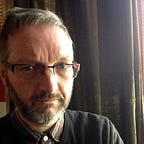‘Not Guilty’
To believe that all of us, everywhere, belong to each other, will inform how we respond to the forces heating the planet. A Thought For The Day on BBC Radio 4’s TodayToday.
This month in a London court, nine women have faced charges of causing half a million pounds of criminal damage to the Canary Wharf headquarters of HSBC.
None of the defendants, aged from 23 to 71, denied that in April 2021 they used hammers and chisels to crack the windows of the building and glue on stickers reading ‘£80 billion into fossil fuels in the last five years.’
The prosecution argued that whatever their motives, there was no lawful excuse for what they did.
On Thursday the jury disagreed and unanimously found the women not guilty.
Groups like this may be dismissed as trouble-makers but others argue that this was how people once responded to the suffragettes or those who marched in the civil rights movement.
Maybe it depends on what we think of climate change — and that might depend on where in the world we live.
After the case, one of the women, Susan Reid, a retired community worker from Preston, said she’d spent her life caring for others.
She then quoted a UNICEF report that weather disasters, exacerbated by climate change, displace 20,000 children from their homes every day.
Seeing a relationship between her life in the UK and every life around the world, Susan Reid was mirroring an idea sacred to many faiths, that all of us, everywhere, belong to each other. We are family.
‘That man, that woman, that child is my brother or my sister,’ as Mother Teresa put it.
With the comfort of hindsight we often honour those whose work for social change we now take for granted. At the time we might oppose their tactics — even if sympathetic to their cause. Don’t we elect politicians to sort this stuff out ?
Maybe. Days ahead of the Cop28 summit in the UAE, scientists predict this will be the hottest year since records began.
Last month Pope Francis said that climate campaigners portrayed as ‘radicalised’ are ‘filling a space left empty by society.’ Society, he said, should exercise a healthy pressure as every family must realise the future of their children is at stake.
The shining thread linking many faith traditions is often called the golden rule.
Jesus put it like this: ‘Do unto others as you would have others do unto you.’
In Hinduism it’s: ‘Do not do to others what would cause pain if done to you.’
This ethic of reciprocity is known as The Law of One — when one is harmed, all are harmed, when one is helped, all are helped.
The version I try to hold onto is framed by a farmer and poet, Wendell Berry — reflecting the cycles of the natural world.
‘Do unto those downstream as you would have those upstream do unto you.’
